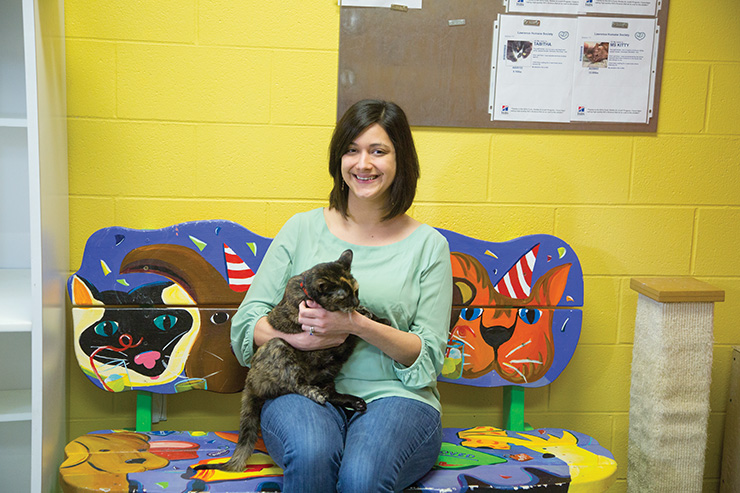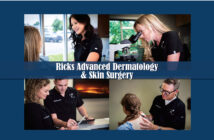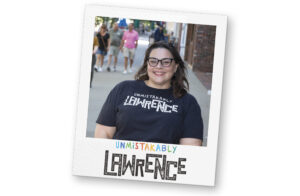Kate Meghji – Executive Director, Lawrence Humane Society
| 2016 Q1 | photos by STEVEN HERTZOG

Kate Meghi, Executive Director, Lawrence Humane Society
1. What is your organization’s most important commodity or service?
The Lawrence Humane Society (LHS) is the community’s only safety net for homeless, abused, lost and at-risk animals. The vast majority of animals we care for each year arrive at our shelter through no fault of their own, and we provide them with a safe haven, medical care, love and much more to give them a second chance at a healthy and happy life.
2. What is your organization’s most important priority?
Our priority is to save more lives and reduce animal overpopulation and homelessness in our community by achieving and exceeding the animal welfare and sheltering industry’s best practices—from basic shelter operations to innovative new programs.
3. What have been some of the most important aspects of your success?
Although animal welfare is my first love, I’ve worked and volunteered with many types of nonprofit organizations because I believe that we are all dealing with symptoms of larger society issues: poverty, violence, lack of education and more. I have a passion for collaboration with other agencies and groups to have greater impact together.
I rarely consider failure as an option. I’m a very analytical person, and with every challenge we face—and every day there are new and surprising ones—I believe that with the right information, the right team and passion for the mission, there is very little we can’t achieve. In the nonprofit world, there is a lot of passion and emotion, and I think these emotional components sometimes impact our ability to make smart business decisions. I think tempering the emotional with the rational allows me to make decisions and create an atmosphere that is professional, compassionate and efficient, and, ultimately, creates second chances for more animals every year.
4. How many people does The Humane Society employ, serve, interact with on a daily basis and are responsible to?
Currently, we have 28 paid employees and more than 400 active volunteers, and are governed by a volunteer Board of Directors. More importantly, last year, we provided shelter and care to more than 3500 animals in need, reunited nearly 600 lost pets with their owners, found new homes for 2300 homeless pets and assisted regional agencies by taking in more than 300 transfers and cruelty seizures. We are the only animal shelter in Douglas County, and we provide stray animal housing for the City of Lawrence, Douglas County and a few small municipalities outside of the county.
5. How do you and your organization make a positive impact on the Lawrence community?
By providing high-quality care and rehabilitation to the animals in our community that need it most, and by providing education and resources to the people in our community to enhance and celebrate the human-animal bond.
6. What do you see as your personal responsibility and your organization’s responsibility to the community?
I have always viewed my responsibility to the community in which I live to utilize my passions and talents to make the world, in some small way, a better place. A better place for animals, for people, for the earth as a whole. I believe that it is the responsibility of the Lawrence Humane Society to be the central pet resource for the entire community through the direct services we provide to animals in need and also through education and advocacy to improve the overall status of animal welfare in our community. And it’s my responsibility to grow our impact in both of these areas to ensure we are able to meet the needs of our community now and in the future.
7. What would you change about doing business (or working with businesses) in Lawrence?
I love the business community in Lawrence! Businesses in Lawrence seem to really care about giving back to the community through both financial support and volunteering, and the support that our organization receives from local businesses is simply tremendous. The only challenges we face are those related to Kansas laws—for example, nonprofit animal shelters are not sales-tax exempt in Kansas, but most other broad categories of nonprofits, like museums or zoos, are exempt.
8. Why did you become involved (what inspired you—is there a specific thing, person or incident)?
I came to this field accidentally, and I’m so thrilled that I did. During college, I worked as a medical assistant at the student health center, and when I graduated, I needed a job while considering graduate schools. I saw that the local humane society was hiring a medical assistant, so I applied and got the job, and that did it for me. While I had adopted animals from shelters, I really had no comprehension of the severity of animal overpopulation and homelessness, and the daunting tasks that shelters have in dealing with these issues with such limited resources. I was really lucky—the executive director of the shelter who hired me and promoted me into several positions, including shelter manager, really mentored and inspired me to continue to grow my professional skill set to become an effective and compassionate manager. He really emphasized the importance of being a good business manager and a good steward of donor funds, in addition to being a passionate advocate for homeless animals, which is something I believe in strongly to this day.
9. What is the biggest challenge you feel your organization faces?
I believe awareness of our services is one of the biggest challenges the Lawrence Humane Society currently faces. Most community members are aware of our adoption and lost-and-found services. Many people, however, believe that the Lawrence Humane Society is animal control—we are not. We partner with our local municipalities to provide sheltering for the animals in our community, which animal control is called to pick up, but we do not actually perform animal-control services.
Additionally, many people are unaware that we offer 24-hour emergency pickup of injured and ill stray animals, and partner with organizations like Just Food and Trinity Lutheran Church to provide pet food for food banks. Nor may they be aware that we try to find homes for feral and less social cats through our barn cat program, that we investigate allegations of animal cruelty, abuse and neglect in tandem with our local law enforcement partners, or that we offer low-cost microchipping for owned animals. We want the community to be proud of the strides we’re making in our community for the welfare of the animals we serve, and awareness of those services we do provide is the first step in that process.
10. As you look toward the future of the Humane Society, what do you see for the organization, and how are you working to make that happen?
For the Lawrence Humane Society to adequately serve our community and its animals—both now and in the future—we need to look at all of our programs and services critically, and determine what our community and its pets need. We want to grow our impact, both inside and outside of our walls. We’re facing challenges in terms of an outdated facility, which currently limits the impact we’re able to have in our shelter. We’re working to address those challenges because we believe the future is bright for animal welfare in our community. And once we address our challenges so that we no longer need to be concerned about providing the animals in our care with the best possible temporary home, we can focus our efforts outside of our building and start working in the community to help underserved and at-risk pets before they walk through our doors.




41 Comments
where to buy ed pills: Ero Pharm Fast – ed online treatment
I think this is a real great post.Thanks Again. Keep writing.
Great blog post.Much thanks again. Really Great.
cheapest ed medication: Ero Pharm Fast – order ed meds online
best ed pills online Ero Pharm Fast ed doctor online
PharmAu24: PharmAu24 – pharmacy online australia
best online doctor for antibiotics: BiotPharm – over the counter antibiotics
ed pills for sale cheap erection pills buy erectile dysfunction pills
commander Cialis en ligne sans prescription: traitement ED discret en ligne – cialis generique
cialis sans ordonnance: Cialis pas cher livraison rapide – pharmacie en ligne france pas cher
I appreciate, cause I found just what I was looking for. You’ve ended my 4 day long hunt! God Bless you man. Have a great day. Bye
acheter Viagra sans ordonnance: livraison rapide Viagra en France – Viagra generique en pharmacie
This is a very good tip particularly to those fresh to the blogosphere. Simple but very precise informationÖ Appreciate your sharing this one. A must read article!
livraison discrète Kamagra: livraison discrète Kamagra – kamagra 100mg prix
trouver un mГ©dicament en pharmacie: acheter medicaments sans ordonnance – vente de mГ©dicament en ligne
I enjoy what you guys are usually up too. This type of clever work andreporting! Keep up the great works guys I’ve incorporatedyou guys to my personal blogroll.
acheter medicaments sans ordonnance: pharmacie en ligne sans prescription – pharmacie en ligne france livraison internationale
Aw, this was an extremely nice post. Spending some time and actual effort to make a great articleÖ but what can I sayÖ I hesitate a whole lot and never seem to get nearly anything done.
This is a topic that is near to my heart… Best wishes!Exactly where are your contact details though?
commander Cialis en ligne sans prescription: Cialis générique sans ordonnance – cialis sans ordonnance
I will right away grasp your rss as I can not to find your e-mail subscription hyperlink or newsletter service.Do you have any? Please permit me understand in orderthat I may just subscribe. Thanks.
Cialis pas cher livraison rapide: Pharmacie en ligne livraison Europe – Pharmacie Internationale en ligne
pharmacie en ligne france livraison internationale: commander Kamagra en ligne – acheter Kamagra sans ordonnance
acheter Cialis sans ordonnance: cialis generique – acheter Cialis sans ordonnance
Thank you so much and I am looking ahead to touch you.
achat kamagra: kamagra 100mg prix – Kamagra oral jelly pas cher
acheter kamagra site fiable: kamagra 100mg prix – commander Kamagra en ligne
cialis prix: Cialis pas cher livraison rapide – cialis generique
Aw, this was a very nice post. Taking a few minutes and actual effort to produce a very good article? but what can I say? I hesitate a whole lot and never seem to get anything done.
traitement ED discret en ligne: Acheter Cialis 20 mg pas cher – cialis sans ordonnance
vente de m̩dicament en ligne: pharmacie en ligne sans prescription Рpharmacie en ligne fiable
kamagra en ligne: achat kamagra – kamagra livraison 24h
Cialis pas cher livraison rapide: cialis sans ordonnance – cialis prix
pharmacie en ligne sans ordonnance: pharmacie en ligne sans ordonnance – pharmacie en ligne
cialis sans ordonnance: pharmacie en ligne france livraison internationale – acheter Cialis sans ordonnance
cialis sans ordonnance: cialis prix – cialis prix
Great article.Much thanks again. Will read on…
SildГ©nafil Teva 100 mg acheter: viagra en ligne – Viagra sans ordonnance 24h
acheter Cialis sans ordonnance: cialis sans ordonnance – traitement ED discret en ligne
cialis sans ordonnance: Cialis pas cher livraison rapide – pharmacie en ligne avec ordonnance
Viagra generique en pharmacie: livraison rapide Viagra en France – Viagra generique en pharmacie